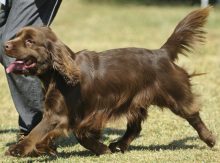Sussex Spaniel
Lifestyle Needs
 The Sussex Spaniel is a heavier built type than its Cocker and Springer cousins. He is a strong, former working gun dog with a distinct rolling gait. The Sussex has a rich, brown abundant coat which will need daily grooming. He is generally a kind and gentle family dog. His working background means that he will need around two hours of exercise every day and plenty of interaction with humans. A house with a large garden is essential. The Sussex Spaniel’s popularity has declined in recent times. This breed has very poor genetic diversity.
The Sussex Spaniel is a heavier built type than its Cocker and Springer cousins. He is a strong, former working gun dog with a distinct rolling gait. The Sussex has a rich, brown abundant coat which will need daily grooming. He is generally a kind and gentle family dog. His working background means that he will need around two hours of exercise every day and plenty of interaction with humans. A house with a large garden is essential. The Sussex Spaniel’s popularity has declined in recent times. This breed has very poor genetic diversity.
Genetic Diversity
(Known as Coefficient of Inbreeding: 'COI'. It should be as low as possible.)
The UK Kennel Club breed average COI is 20.3% - See 'A Beginners Guide to COI'
Gene Pool Size
(Known as Effective Population Size: 'EPS')
32.2
EPS is a measure of how many individuals are contributing genetically to a breed population. It is a measure of the size of the gene pool in a breed. Lower than 100 is considered critical by conservationists and below 50 brings a breed close to extinction. For more information see the Kennel Club article.
Health and Welfare Problems due to Conformation
(Body shape and physical characteristics)
None known
BVA/KC Health Schemes: www.bva.co.uk/chs
Eye Disease
and Multi-focal retinal dysplasia (MRD) (litter screening)
- Hip dysplasia: breed 5 year mean score 37 (parents should be much lower)
- Elbow dysplasia: scores should be as low as possible ideally 0:0
Estimated Breeding Values (EBVs) : No EBVs are currently available for this breed
www.thekennelclub.org.uk/about-ebvs
DNA Tests Available
DogWellNet and IPFD Harmonisation of Genetic Testing for Dogs (HGTD)
www.dogwellnet.com/breeds
Availability of a DNA test does not mean that it is always necessary or even desirable for breeders to use this test.
Other Breed-Specific Health Screening Schemes
None known
Ask the breeder to show you the certificates for the above tests/screening for both parents. If any of the above tests have not been considered necessary by the breeder (and there may be good reasons), ask her to explain why.
Other Diseases Reported
(For which there are currently no genetic or screening tests for sire or dam)
Ear problems
Food and other allergies
Gastric dilatation volvulus (GDV) Bloat
Ask the breeder about the medical history of the parents, grandparents and great grandparents. Consider carefully whether to purchase a puppy if some of these or other diseases are in the family line.
Ask about the breeder’s policy in cases of serious genetic diseases occurring to your puppy in later life. Good breeders will request to be informed of such events in order to improve future breeding decisions.
You are strongly advised to buy from a breeder who uses (or is prepared to use) the AWF Puppy Contract and Puppy Information Pack (PIP): www.puppycontract.org.uk
The breeder should also be familiar with the CFSG/DBRG Code of Practice for Dog Breeding